
Your Complete Homeowner’s Guide to TNB’s New Electricity Tariff (Effective 1 July 2025)
If you’re a homeowner in Malaysia, your electricity bill has officially changed starting 1 July 2025. This new billing system may look confusing, but this guide will help you understand everything in clear, simple terms — so you don’t need to go hunting for answers. And if anything’s still unclear, just reach out to our energy experts!
1. What changed in TNB’s tariff restructuring effective 1st July 2025?
TNB updated how it calculates your electricity bill.
Here’s a side-by-side comparison:
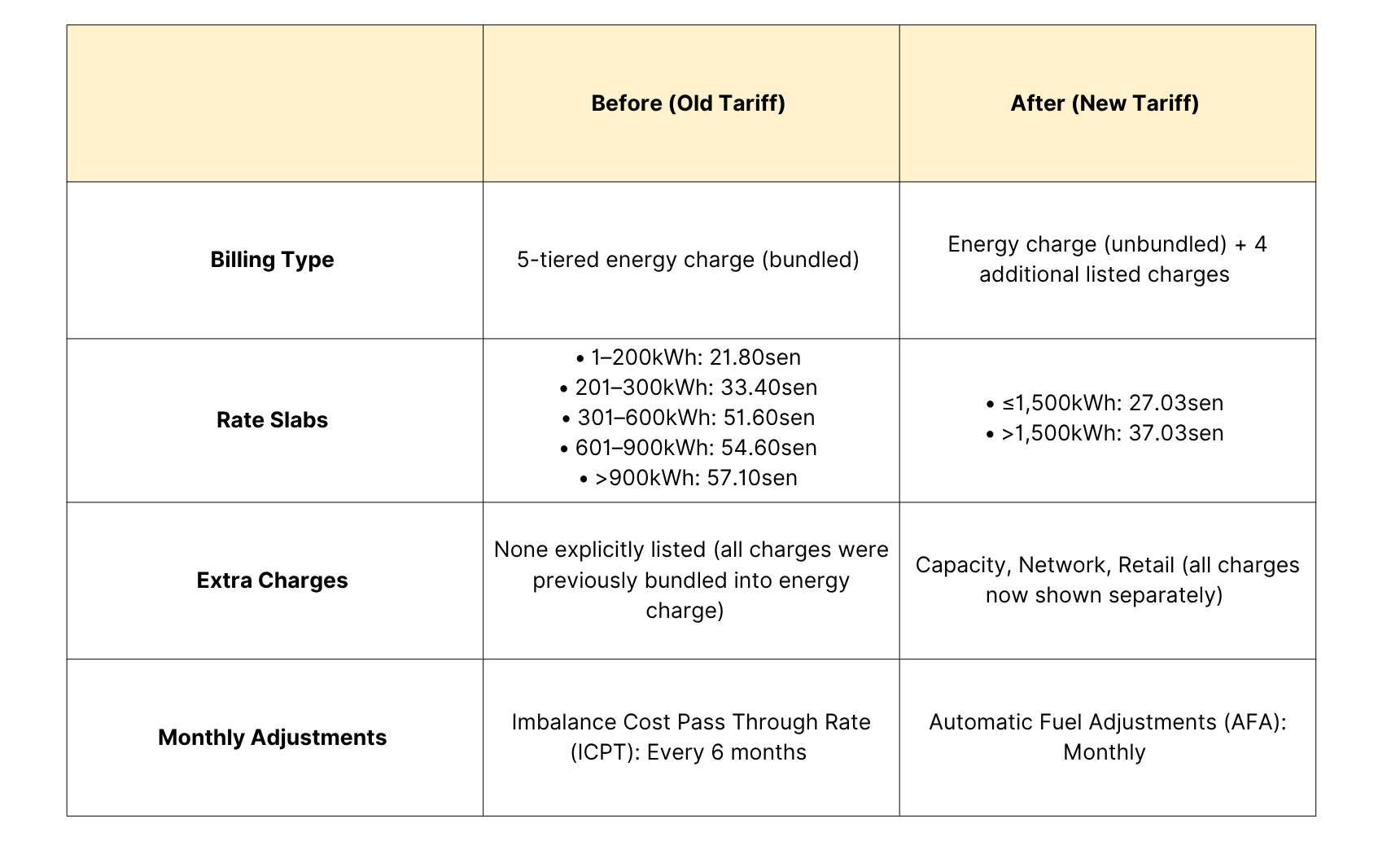
2. What are the new bill components?
Your monthly TNB bill now includes:
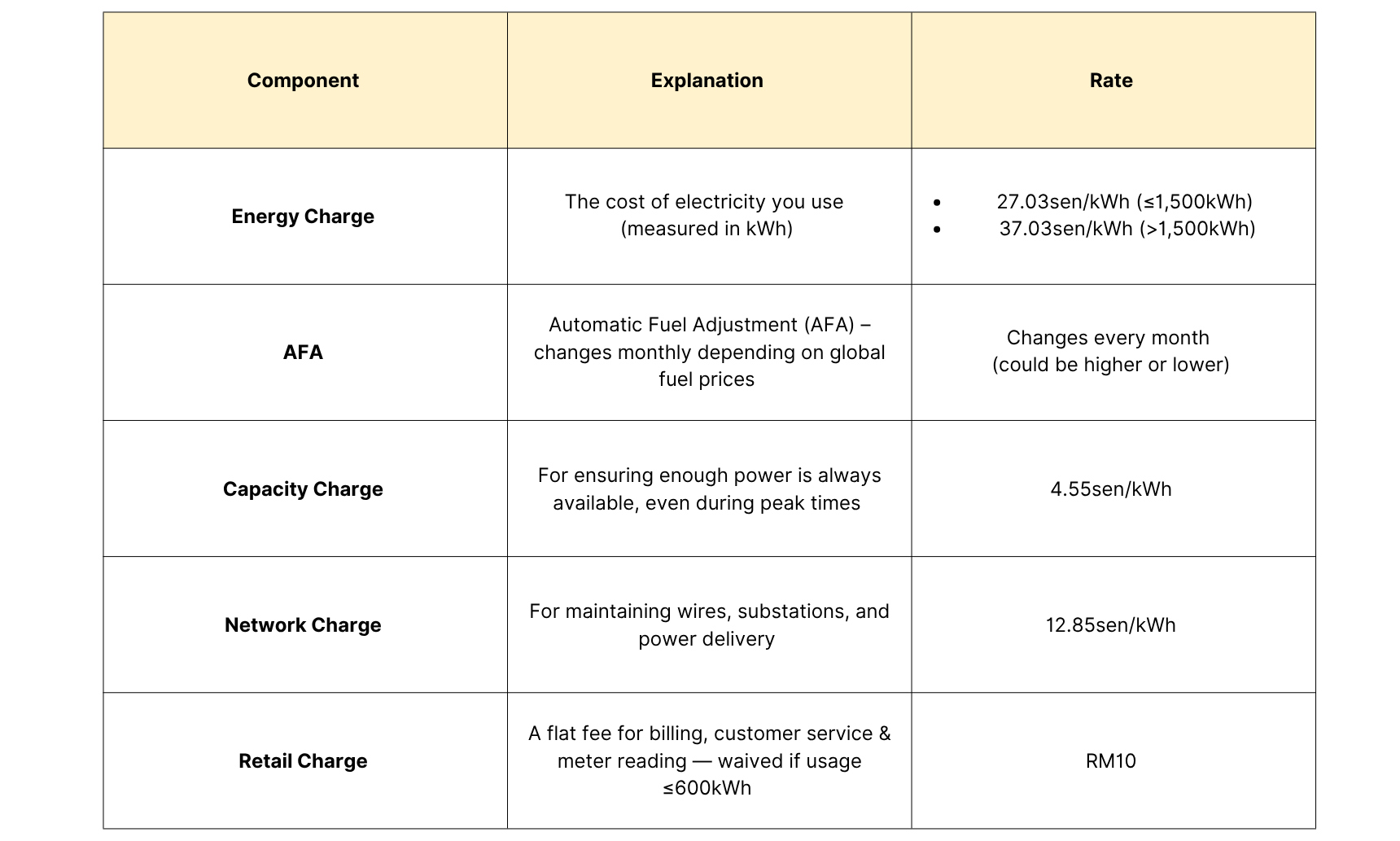
3. What’s the AFA?
AFA = Automatic Fuel Adjustment
It changes monthly based on global fuel prices and can increase or lower your bill slightly.
Think of it like a “fuel surcharge” — similar to petrol prices.
4. When did it take effect?
The changes kicked in on 1 July 2025 and will stay until 31 December 2027, under the RP4 regulatory period.
5. Will my bill be higher now?
TNB estimates that about 85% of households will pay the similar or less, especially if they use ≤ 1,000 kWh/month
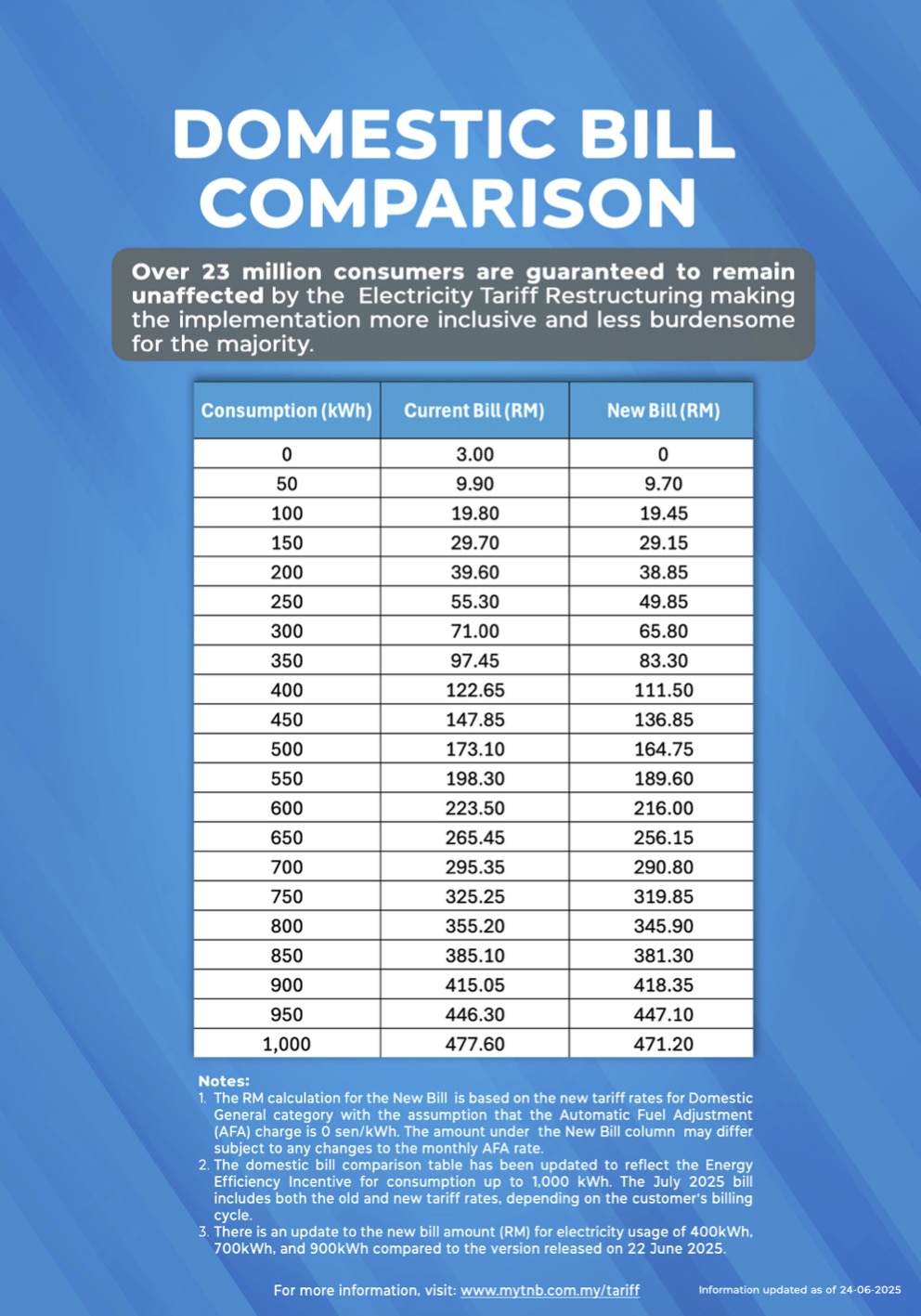
6. Does this affect all homeowners in Malaysia?
Yes. Any residential customer in Peninsular Malaysia will fall under:
- Domestic General Tariff (default),
— which charges the same energy rate all day no matter what time you use electricity, or - Domestic Time-of-Use (ToU) Tariff (if opted in),
— where electricity rates vary depending on the time of day.
7. General Tariff vs. Time-of-Use (ToU) Tariff: What’s the difference?
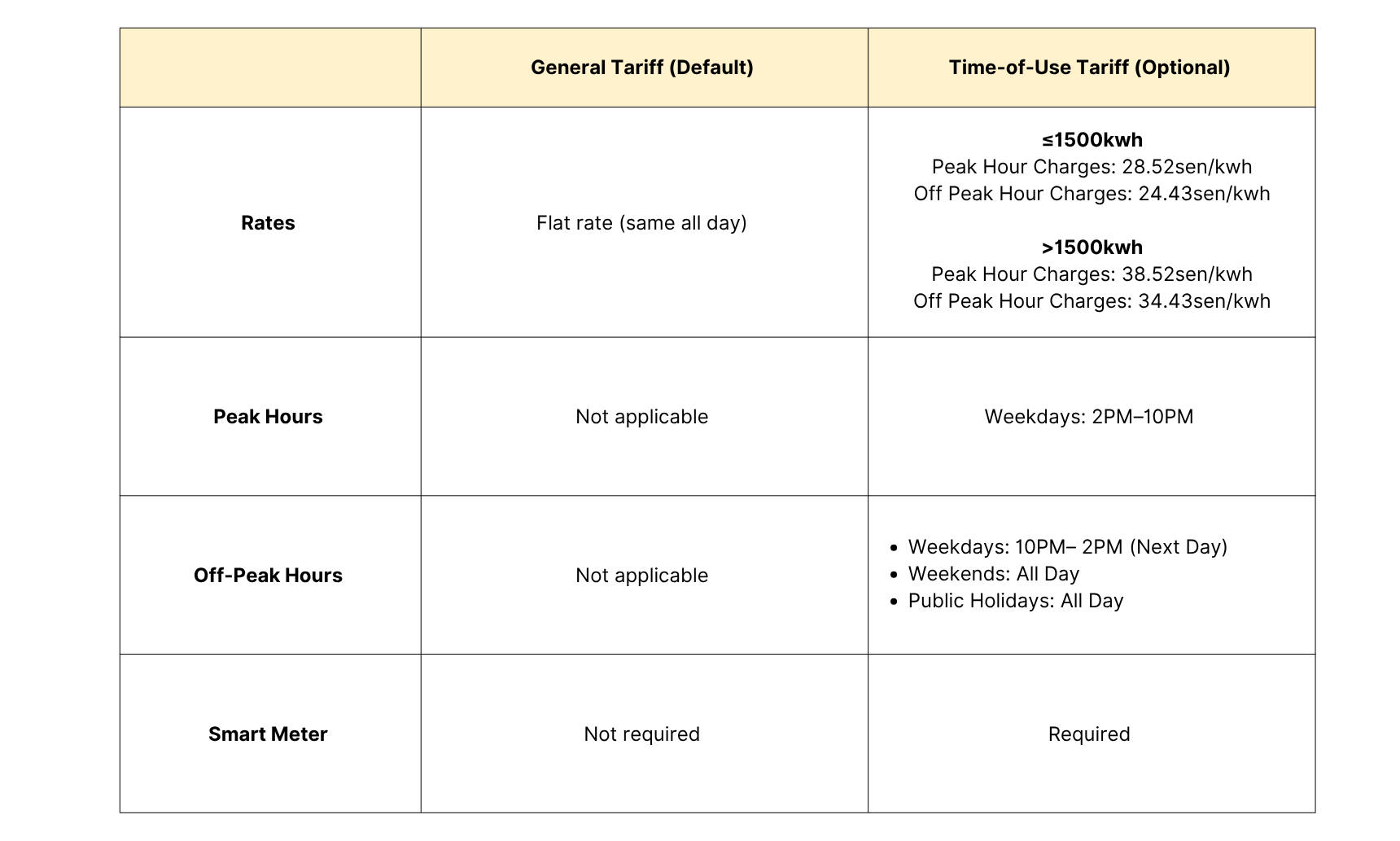
8. What is a smart meter?
A smart meter is an advanced digital meter that records electricity usage by time/day (e.g., hour). It enables time-based billing, needed for enrolling in the ToU tariff. According to TNB’s website, they are rolling this out in phases within Semenanjung Malaysia and it’s completely free. “You will receive an Installation Notice via mail about month before Smart Meters are to be installed in your neighbourhood”
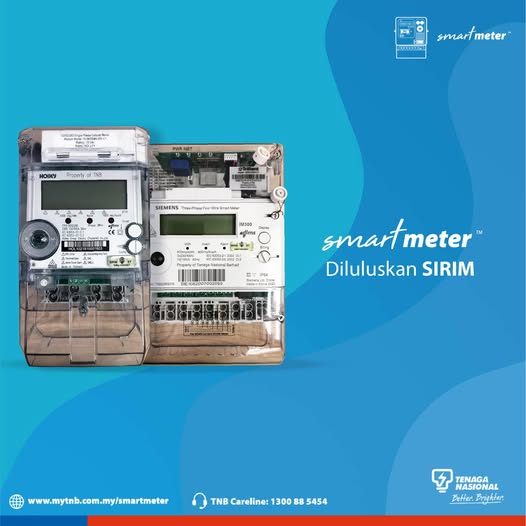
9. Are there rebates or incentives available?
Yes! Here's what homeowners get:
A. Energy Efficiency Incentive (EEI):
- Applies to households using up to 1,000kWh/month.
- Energy Charge rebate of up to 25 sen/kWh, depending on usage.
- For those using between 50–900 kWh, bills are lowered by 1% to 15%.
B. Retail Charge Waiver:
- Normally RM10/month but waived if usage is 600 kWh or less.
C. RM40 Monthly eKASIH Rebate:
- For households under the Miskin Tegar category registered under e-Kasih, a RM40/month rebate applies.
These rebates ensure households consuming efficiently or in need are protected or rewarded under the new structure. Refer here for details.
10. How do I read my new bill?
Your bill is now clearly itemised and lists each cost separately—Energy, AFA, Capacity, Network, Retail, plus any rebate. You should receive 2 electricity bills in July (a transitional bill), that shows both your old and new tariff structures and rates (refer image below).
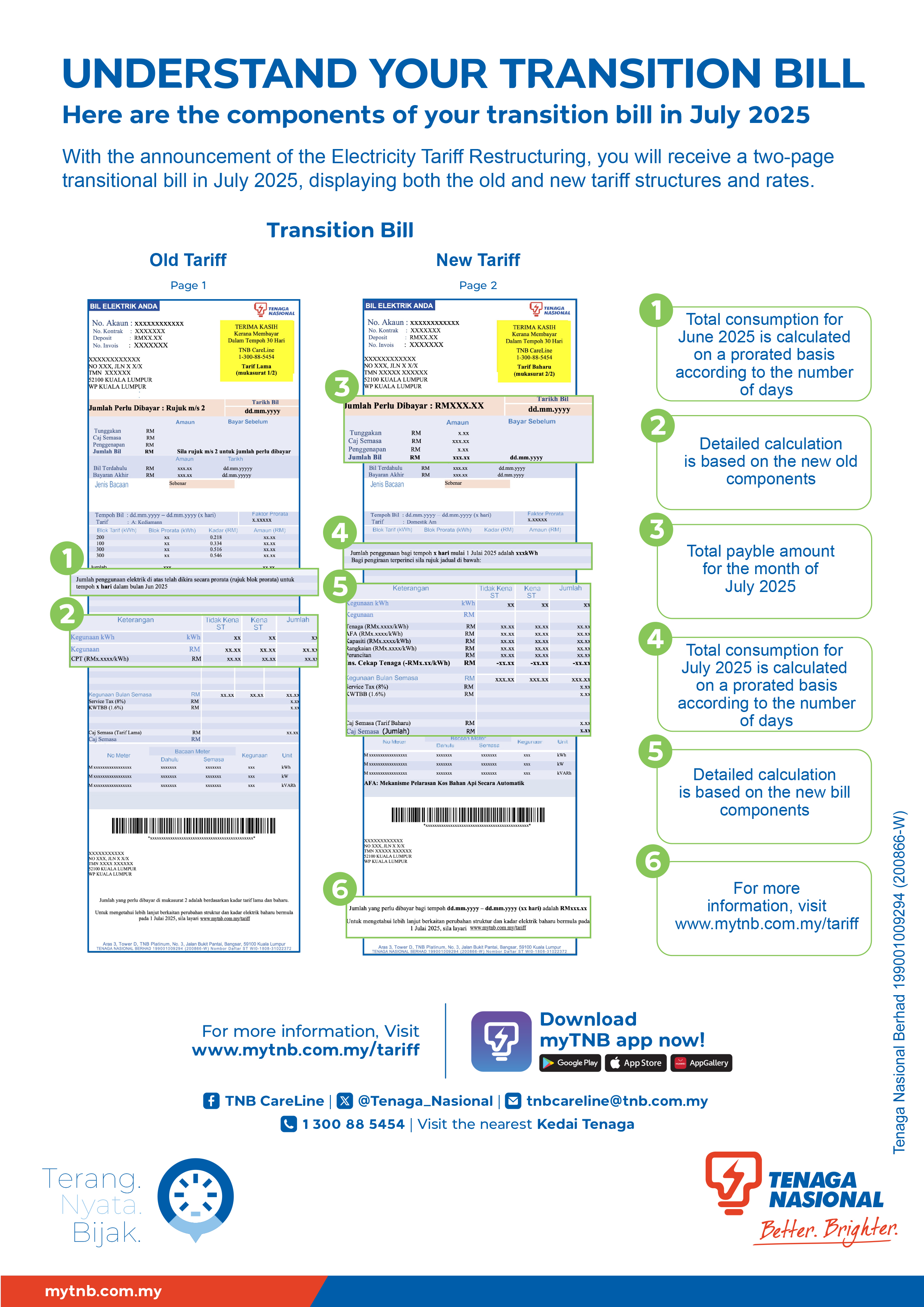
11. Should I stay on General Tariff or switch to ToU?
Stick to General Tariff if:
- You use electricity mostly in the daytime (e.g., aircond, cooking, working from home).
- You don’t want to track peak/off-peak times.
Consider ToU Tariff if:
- You use most electricity at night or early mornings. (e.g., charge EVs, laundry at night).
- You’re often away for the most part between 2PM to 10PM on weekdays.
- You already have a smart meter.

12. Is there an official TNB guide?
Yes—check the Tariff Schedule and bill calculator on myTNB. They also provide FAQs and step-by-step explanations.
13. Why did TNB restructure their tariffs?
To make billing fairer and clearer, aligning tariffs with actual costs (fuel, network, capacity), and promote efficient electricity use through transparent incentives and monthly fuel adjustments (AFA).
14. Will more fees be added?
Nothing announced. The current five-part structure is designed to be transparent and stable through RP4. Changes after 2027 will depend on future regulatory reviews. Keep updated through TNB and the Energy Commission.
15. How do I keep track of updates?
Follow myTNB.com.my, myTNB official app, and Energy Commission for latest releases. Your bill and myTNB dashboard will detail any AFA changes monthly. Or follow Sunview Group’s official social media pages for the latest updates!
16. How can I reduce my electricity bill?
Start with these high-impact changes:
- Shift your usage: If you're on a Time-of-Use (ToU) plan, run energy-hungry appliances (like air conditioners, ovens, water heaters, and washing machines) during off-peak hours to enjoy lower rates.
- Upgrade your appliances: Choose 5-star energy-rated models — they consume less power for the same work.
- Cut wastage: Turn off lights, fans, and devices when not in use. Even standby power adds up.
- Consider solar: With the new structure, generating your own electricity can significantly reduce both your usage charges and fixed fees.
17. What appliances use the most?
- Air conditioners (especially if used for long hours).
- Water heaters (instant or storage types).
- Electric vehicle (EV) chargers.
- Fridge
18. Can solar power help under the new structure?
Yes. Solar lets you use your own electricity first and helps reduce your draw from the grid. This lowers your energy charges. You’re only charged TNB tariffs when solar consumption is low and you rely on the grid (e.g. at night).
19. Is it worth installing solar now?
Yes — maybe more than ever. The new structure rewards you for using less grid electricity, which solar helps with. But make sure to:
- Check your roof size and condition
- Understand your daytime usage patterns
- Calculate your payback period
If your home uses a lot of power during the day, solar can help you lock in long-term savings — and protect against future tariff hikes.
Reach out to Sunview Group if you’re looking for solar as an energy alternative.
20. Your clean energy partner
With the new TNB tariff structure, smart solar planning matters more than ever. Sunview helps you:
- Understand your bill and how solar affects it
- Maximise savings by matching system size to your usage
- Assess your roof, and customise solar system designs to fit your usage.
- Future-proof your home against rising electricity costs.
Making Sense of the New TNB Tariff
The new TNB tariff structure isn’t just a price hike — it’s a shift in how electricity is billed. It's now about when you use power, how much you rely on the grid, and how efficient your home is.
Understanding your bill is the first step. Managing your usage is the next. Whether it’s changing your habits, upgrading your appliances, or exploring solar — the power to reduce your costs is in your hands.
Stay informed. Use wisely. And make every unit count.
Interested to see how solar can help you lower your electricity bills? Reach out to our energy experts for a free consultation.
Disclaimer:
This article is intended for informational purposes only and is based on publicly available data as of July 2025. While we strive for accuracy and clarity, TNB tariff structures and charges may change or be interpreted differently by official sources. For the most accurate and current information, please refer directly to TNB or consult with our certified energy professionals before making any decisions.






